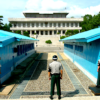
Ann Wright responds to a Newsweek opinion column last week smearing Women Cross DMZ, other peace organizations and individuals, including herself, as “pro North.”
Pro-Western Syrian exiles have issued a diatribe against the most informative critics of U.S. war policy at a time when Washington’s aggressiveness is reaching new levels of intensity.
Ann Wright reports on the launch earlier this month, in D.C. and New York, of the worldwide “Korea Peace Now” campaign.
The following is a statement given by Inder Comar at a side event of the 37th Regular Session of the UN Human Rights Committee in Geneva, Switzerland, on March 15, 2018.
Brushing aside warnings that he was about to unleash Armageddon in the Middle East, George W. Bush launched an unprovoked attack on Iraq on March 19-20, 2003, the ramifications of which we are still grappling with today, Nat Parry writes.
Donald Trump has called for a military parade in Washington DC but a coalition of peace and justice groups hope to stop the parade before it happens, explains Margaret Flowers in this interview with Ann Garrison.
From the Archive: Today is the 15-year anniversary of what was described as “the largest protest event in human history” – the Feb. 15, 2003 coordinated day of demonstrations against the U.S. invasion of Iraq. On this occasion we republish…
Exclusive: Although the North Korea crisis has largely faded from the headlines, the chances of war breaking out are still unacceptably high – requiring greater attention from both the peace movement and Congress, notes Jonathan Marshall.
Recent policy directives raise concerns over new U.S. postures towards great power conflicts and developing “tactical” nuclear weapons, underlining the need for a revival of the U.S. antiwar movement, write Kevin Zeese and Margaret Flowers.